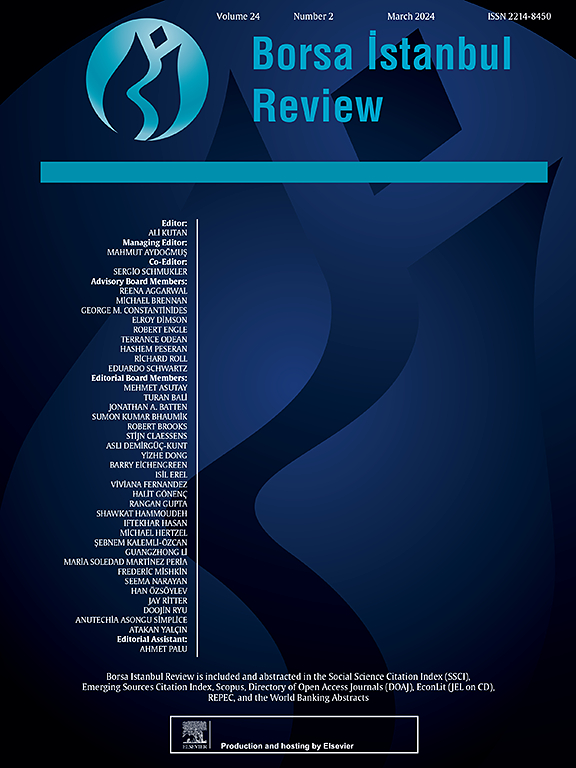Return spillovers between Islamic and conventional banking rates: Evidence from emerging Islamic countries
IF 7.1
2区 经济学
Q1 BUSINESS, FINANCE
引用次数: 0
Abstract
This study examines return connectedness and spillover shock effects between Islamic profit-sharing rates (PSR) and conventional deposit rates (DPR) of banking sectors across various maturities in Türkiye and Malaysia. Overall, financing rates with various maturities in Türkiye act as transmitters of shocks in both banking sectors. Specifically, short-term rates serve as net spillover transmitters, while long-term rates of DPR and PSR emerge as primary transmitters and receivers, respectively. Total directional connectedness analysis reveals that the degree of integration between sectors fluctuates over time, with political instability and monetary policy actions being key drivers. Although conventional deposit rates dominate their Islamic counterparts in the early part of the study period, a significant policy rate hike in 2014 shifts this balance in favour of profit-sharing rates, suggesting that the conventional banking sector has become increasingly susceptible to shocks originating from the Islamic banking sector in recent years. Moreover, Türkiye's adoption of unconventional monetary policies has reduced integration within the banking system, thereby altering the dynamics of return spillovers, with deposit rates acting as main transmitters. We observe a relatively stable connectivity mechanism over time in Malaysia, where market risk becomes stronger as of 2020. Both short-term rates are net transmitters during most of the sample period, and medium- and longer-term tenors of the Islamic (conventional) banking sector function as net receivers (transmitters). DPR is shown to exert a substantial influence over PSR, with spillover shock effects being more pronounced for shorter tenors. While global factors strongly influence overall connectivity in Türkiye, local factors such as exchange rates, interest rates, and credit default swaps (CDS) play a critical role in net shock transmission. DPRs are shown to be dominant factors in predicting PSRs in Türkiye and both sectors exhibit stronger interactions at higher intervals of time.
伊斯兰和传统银行利率之间的回报溢出效应:来自新兴伊斯兰国家的证据
本研究考察了土耳其和马来西亚不同期限银行部门的伊斯兰利润分享率(PSR)和传统存款利率(DPR)之间的回报连通性和溢出冲击效应。总体而言,日本不同期限的融资利率在两大银行业中都充当着冲击的传导器。具体而言,短期利率是净溢出的发送器,而DPR和PSR的长期利率分别是主要的发送器和接收器。总定向连通性分析显示,各部门之间的一体化程度随时间而波动,政治不稳定和货币政策行动是关键驱动因素。尽管传统的存款利率在研究期间的早期占主导地位,但2014年的一次重大政策加息使这种平衡转向了利润分享利率,这表明传统银行业近年来越来越容易受到来自伊斯兰银行业的冲击。此外,日本采取的非常规货币政策减少了银行体系内部的一体化,从而改变了回报溢出效应的动态,存款利率成为主要的传导因素。我们观察到,随着时间的推移,马来西亚的互联互通机制相对稳定,其市场风险从2020年开始变得更强。在大多数抽样期间,两种短期利率都是净发送者,而伊斯兰(传统)银行部门的中期和长期利率则是净接收者(发送者)。DPR对PSR产生重大影响,在较短的期限内,溢出冲击效应更为明显。虽然全球因素对全球经济的整体连通性有很大影响,但汇率、利率和信用违约掉期(CDS)等当地因素在净冲击传导中发挥着关键作用。DPRs被证明是预测 rkiye中pprs的主要因素,两个部门在较高的时间间隔内表现出更强的相互作用。
本文章由计算机程序翻译,如有差异,请以英文原文为准。
求助全文
约1分钟内获得全文
求助全文
来源期刊

Borsa Istanbul Review
Multiple-
CiteScore
7.60
自引率
3.80%
发文量
130
审稿时长
26 days
期刊介绍:
Peer Review under the responsibility of Borsa İstanbul Anonim Sirketi. Borsa İstanbul Review provides a scholarly platform for empirical financial studies including but not limited to financial markets and institutions, financial economics, investor behavior, financial centers and market structures, corporate finance, recent economic and financial trends. Micro and macro data applications and comparative studies are welcome. Country coverage includes advanced, emerging and developing economies. In particular, we would like to publish empirical papers with significant policy implications and encourage submissions in the following areas: Research Topics: • Investments and Portfolio Management • Behavioral Finance • Financial Markets and Institutions • Market Microstructure • Islamic Finance • Financial Risk Management • Valuation • Capital Markets Governance • Financial Regulations
 求助内容:
求助内容: 应助结果提醒方式:
应助结果提醒方式:


